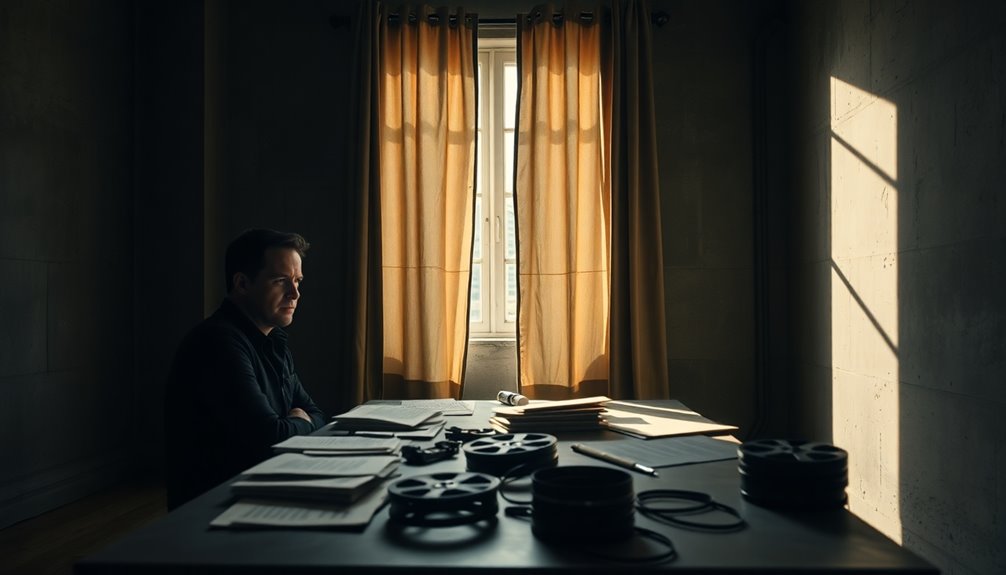Brady Corbet’s revelation about *The Brutalist* is surprising. Despite the film’s critical acclaim and $26 million box office success, he admitted he earned nothing from it. This highlights the often harsh financial realities in the film industry, where artistic vision sometimes takes precedence over profit. The situation serves as a reminder that not all successful films translate to financial gain for their creators. If you want to know more about the film’s themes and achievements, keep exploring. Furthermore, the conversation around The Brutalist sparks discussions about the broader implications of funding and investment in the arts. It raises questions about how creators can protect their interests in an industry that often prioritizes theatrical success over equitable compensation. Interestingly, this situation parallels other high-profile cases in the media, such as the marvin harrison murder case details, where public attention can overshadow the intricacies involved in the pursuit of success and justice. As viewers and supporters of cinema, it’s essential to reflect on how these dynamics shape not only the films we love but also the lives of those who create them.
Key Takeaways
- Despite *The Brutalist* grossing $26 million, director Brady Corbet reported no personal profit from the film.
- The film's financial success contrasts with Corbet's admission, highlighting an unusual aspect of the film industry.
- Corbet prioritized artistic vision and storytelling over financial gain while creating the film.
- The production's financial structure raises questions about funding and profitability in artistic projects.
- *The Brutalist* received critical acclaim, winning prestigious awards, emphasizing that art's value can exceed monetary benefits.

Brady Corbet's *The Brutalist* emerges as a bold epic period drama that delves into the complexities of the American Dream through the eyes of a Holocaust survivor. Despite its critical acclaim and multiple awards, Corbet recently admitted that he personally didn't make a profit from the film. This revelation comes as a surprise given the film's success, grossing $26 million worldwide against a budget of $9.6 million.
Brady Corbet's *The Brutalist* captivates audiences yet left its director without personal profit despite its financial success.
You might wonder how a film that's celebrated at the Venice International Film Festival and nominated for ten Academy Awards could leave its director without financial gain. Corbet's artistic vision, co-written with Mona Fastvold, focuses on the profound themes of immigration and identity, reflecting his deep personal connection to family history. His dedication to storytelling over financial reward is commendable, yet it raises questions about the broader financial structure of the film industry. This complexity is further underscored by the film's innovative technical choices such as the revival of intermissions and VistaVision. Moreover, the film's success highlights the private equity investment landscape, which often influences funding for artistic projects.
The film, featuring a stellar cast including Adrien Brody, Felicity Jones, and Guy Pearce, showcases a narrative that intertwines the struggles of its lead character—a Hungarian-Jewish Holocaust survivor—against the backdrop of architectural inspiration drawn from renowned figures like Paul Rudolph and Marcel Breuer.
While *The Brutalist* has been praised for its direction, performances, and innovative technical choices, such as the revival of intermissions and VistaVision, it's clear that the financial aspect of filmmaking can often overshadow artistic achievements.
Despite the lack of profit, Corbet's work has made a significant impact, earning the Silver Lion for Best Direction and winning three Golden Globe Awards, including Best Motion Picture – Drama.
*The Brutalist* stands as a testament to the power of storytelling, reminding you that sometimes, the value of art transcends monetary gain. Corbet's experience serves as a poignant reminder that passion and purpose often drive true success in the creative world.
Frequently Asked Questions
What Inspired Brady Corbet to Create 'The Brutalist'?
Brady Corbet was inspired to create "The Brutalist" through his fascination with architecture, particularly the raw, provocative nature of Brutalism.
He drew from his family's architectural background and the themes of immigration and trauma that resonate within the style.
How Did 'The Brutalist' Perform at Film Festivals?
You'd be thrilled to know that *The Brutalist* made quite a splash at film festivals.
It garnered a warm reception, highlighted by a 13-minute standing ovation at Venice, where Brady Corbet bagged the Silver Lion for Best Director.
At the New York Film Festival, it stood out for its profound cinematic impact, captivating audiences and critics alike.
This film became one of the most anticipated conversations in the festival circuit.
What Themes Are Explored in 'The Brutalist'?
In "The Brutalist," you'll encounter themes of identity and belonging, particularly through the immigrant experience and Jewish identity.
The film explores trauma and resilience, showcasing the lasting effects of the Holocaust and coping mechanisms like addiction.
Social commentary critiques anti-Semitism and the American Dream, while artistic expression is central, highlighting László's battle for autonomy amid power dynamics.
Ultimately, the narrative emphasizes the healing power of creativity in overcoming adversity.
Who Are the Main Actors in 'The Brutalist'?
You'll find that the ensemble cast of *The Brutalist* is nothing short of remarkable.
Adrien Brody shines as László Tóth, while Felicity Jones captivates as Erzsébet Tóth.
Guy Pearce and Joe Alwyn add depth in their roles as Harrison and Harry Lee Van Buren, respectively.
Raffey Cassidy portrays László's niece, Zsófia, rounding out a talented group.
Each actor brings a unique flair, enriching the film's intricate narrative and emotional resonance.
What Is Brady Corbet's Background in Filmmaking?
Brady Corbet's background in filmmaking is rich and varied.
You'll find that his early passion for cinema led him to start making short films as a teenager, often exploring themes of trauma.
With a background in acting, he transitioned to directing, influenced by European arthouse cinema.
His work reflects a philosophical curiosity, focusing on historical themes and the cyclical nature of trauma, showcasing his unique voice in contemporary filmmaking.
Conclusion
In the end, Brady Corbet's experience with 'The Brutalist' highlights the harsh realities of the film industry. Even though he didn't earn a dime, his artistic vision remains intact. It's fascinating to note that around 80% of independent films struggle to turn a profit, emphasizing just how challenging it can be to create meaningful art. So, while profit isn't always the goal, passion and creativity often shine through, making the journey worthwhile for artists like Corbet.









